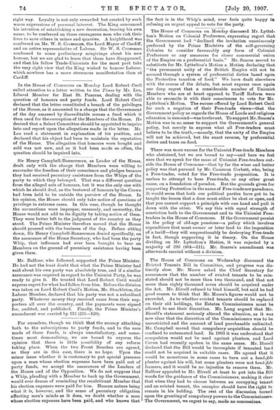The House of Commons on Monday discusaed Mr. Lyttel- ton's
Motion on Colonial Preference, expressing regret that the Government had "declined the invitation unanimously preferred by the Prime Minittafs of the self-governing Colonies to consider favourably any form of Colonial Preference or any measures for closer commercial union of the Empire on a preferential basis." Mr. Soares moved to substitute for Mr. Lyttelton's Motion a Motion declaring that "the permanent unity of the British Empire will not be secured through a system of preferential duties based upcin the Protective taxation of food." We have dealt elsewhere with the course of the debate, but must express once again our deep regret that a considerable number of Unionist Members who are at heart opposed to Tariff Reform were able to reconcile it with their consciences to vote for Mr. Lyttelton's Motion. The excuse offered by Lord Robert Cecil for such a negation of their Free-trade views—that the Government policy as regards the House of Lords and religious education is unsound—was irrelevant. To support Mr. Soares's Motion was in no sense to support the Government's general policy, but merely to express what all Free-traders must believe to be the truth,—namely, that the unity of the Empire will not be achieved, but the exact reverse, by preferential duties and taxes on food.






































 Previous page
Previous page